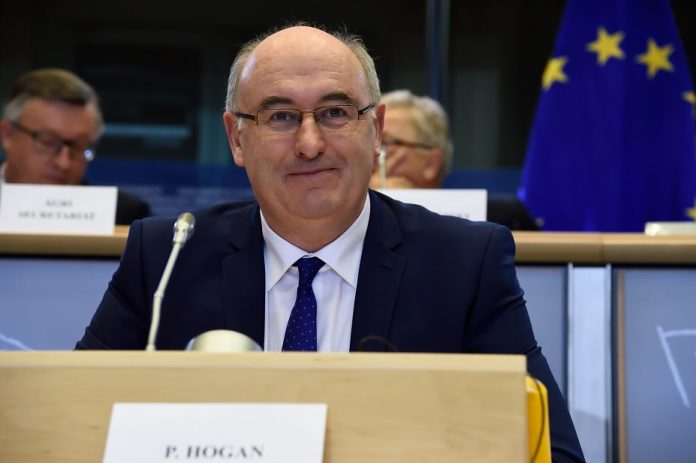Eradicating food insecurity remains a global challenge. In a speech, EU Agriculture Commissioner Phil Hogan highlights why working in partnership is vital
The goal of eradicating global hunger has never been as high on the international policy agenda as it is today.
This fact is to be welcomed, because there is no region of the planet that has not been affected by hunger and its crushing effect on human wellbeing and society. We know that developing sustainable food security and fighting hunger go hand in hand.
In Europe, the CAP (Common Agriculture Policy) was established to fight food insecurity in post-war Europe, and it has served our continent well for the past 60 years. Today, the policy has a far more global outlook and it is more closely aligned to other important EU policies, such as development and regional cooperation. Working in cooperation with our global partners, there is a clear realisation that agriculture is critical for economic development, prosperity and food security in all regions of the world.
This is particularly true in Africa, where 300 million young people will reach employment age in the next 15 years. These citizens are already born, and two-thirds of them come from rural areas. Urgent action is needed to end rural poverty and provide jobs and prospects for these young people – who hold the continent’s future wellbeing in the palm of their hands.
Supporting a rural economy
Agriculture and rural development is the chief focus of EU development assistance. More than 60 partner countries have agriculture or the rural economy as a focal sector.
The EU is ready to invest up to €8.8 billion in the 2014- 2020 period drive this agenda, with a focus on small scale farmers and on preparing the most vulnerable to better cope with food crisis.
Our support also goes to the development of value chains and in providing smallholder farmers with better access to local, national and regional markets. As farming remains largely a private sector activity, the private sector and responsible agribusiness investments have a major role to play.
Global agriculture has to meet a triple challenge: to raise farm incomes, to boost productivity to feed a global population of 9 million in 2050, and to do so in a way that conserves resources for future production needs.
Bearing this fact in mind, it is fair to say we are now at a policy crossroads.
Sustainable goals
Agriculture is the heart of Sustainable Development Goal 2: ending hunger and extreme poverty by 2030. 60% of developing economy populations rely on agriculture, this is particularly acute among the very poor, with up to 80% relying on farming.
The SDGs recognise that agriculture plays a substantial role in any truly sustainable future, given that it is intrinsically linked to issues such as jobs, food, air, climate change, water, soil and biodiversity.
In the EU, we have been streamlining our policy work to ensure a more coherent approach across all our policies in this regard, including our agriculture and rural development policies.
But we can and will do even more.
Common Agricultural Policy
The CAP is currently going through a modernisation and simplification process which will maximise its contribution to meeting the targets of the Sustainable Development Goals.
We’ve just finished a major public consultation on the future of the CAP that will feed into a Commission Communication later this year.
Developing partnerships
It is my hope that 2017 will be a defining year for European agriculture and its contribution to food security and sustainability both at home and abroad.
2017 is also a defining year for the partnership between Europe and Africa.
The 5th Africa-EU Summit in November 2017 can give fresh impetus to this partnership. Together with the AU Commissioner, Mrs. Josefa Sacko, we organised an EU-AU ministerial conference on the theme of “Making Sustainable Agriculture a Future for youth in Africa”. Our aim was to build up political engagement and agree desirable concrete outcomes for the summit.
To fuel the growth of Africa’s economy, investments are needed. Neither Official Development Aid nor Remittances can provide sufficient resources. Private investment is required – indeed it is already the biggest source of development funding.
Responsible investment in the rural and agricultural economy; value chains and integrated markets; the sustainable management of natural resources: these are all key factors for economic growth, job creation and development in African countries.
They should be accompanied by a better focus on research and innovation with Information and Communication Technology and digitisation as important enablers.
A further key to growth is generating increased value added for African products, coupled with better access to higher-value international markets. Young African agri-entrepreneurs need quality products to sell, better production methods to grow them, and access to good markets upon which to sell them.
EU trade policy and our partnership agreements give guaranteed access to EU markets and stability for investments.
We are consolidating the relationship with Farmers’ Organisations and agribusiness to include them in policy dialogues under the Economic Partnership Agreements.
To accelerate this process, new impetus is needed for research and innovation to drive sustainable agricultural productivity. The focus should clearly be on: sustainable food and nutrition security; resource-use efficiency; and climate-smart agriculture. We have to strengthen the link between research, farmers and the industry.
External Investment Plan
The EU’s proposed External Investment Plan (EIP) will introduce a landmark shift in how the EU works in partnership with Africa countries. It provides a comprehensive framework for a massive mobilisation of private investment.
The purpose of the Commission’s 2016 proposal on the External Investment Plan is to support investment, strengthen partnerships, promote a new model of private sector participation, contribute to the achievement of the Sustainable Development Goals and address the root causes of migration in Africa and the European Neighbourhood.
The EIP is there to strengthen socio-economically important sectors, and so agriculture is of primary importance as a target of the EIP.
The farming and agri-food business communities have a key role to play, while governments and public sector must promote a stable, responsible and inclusive business environment.
The goal is to set in motion a virtuous cycle of investment, which will drive both food security and economic growth, which in turn will help to erase hunger.
This is an edited version of a speech by the Commissioner at the Panel discussion on “Zero Hunger: Regional Commitments to Eradicate Hunger, Food Insecurity and Malnutrition”, in Rome last month and can be found here.
Phil Hogan
EU Commissioner for Agriculture
European Union
phil.hogan@ec.europa.eu
https://ec.europa.eu/commission/commissioners/2014-2019/hogan_en











